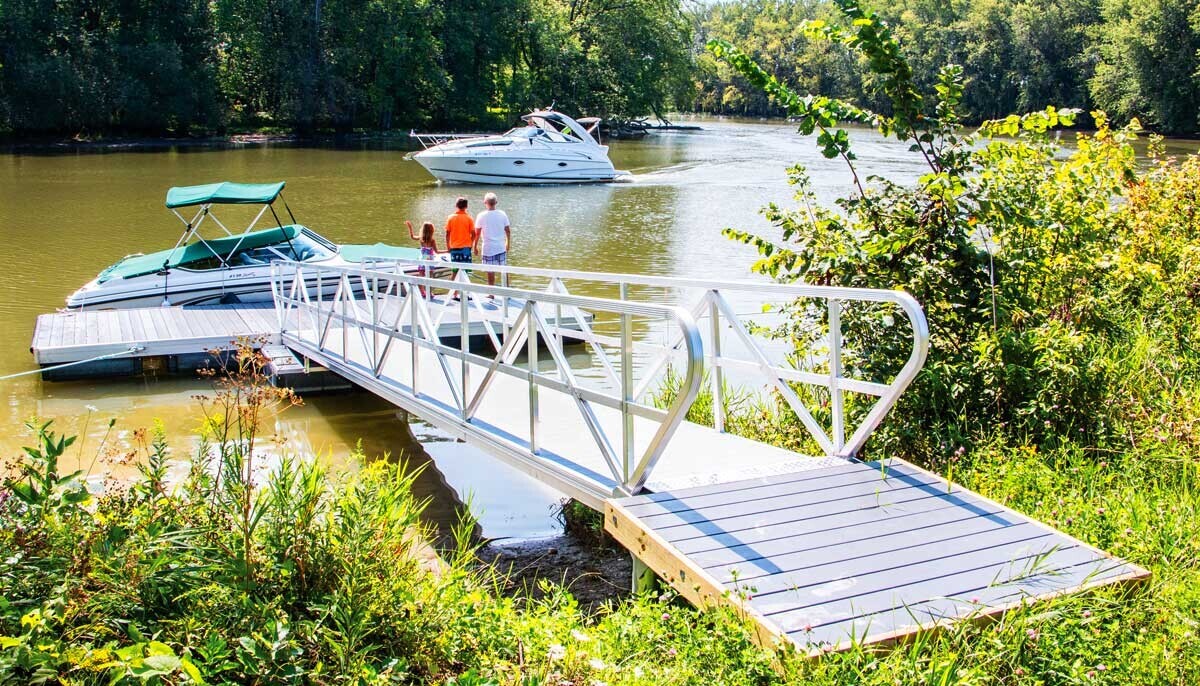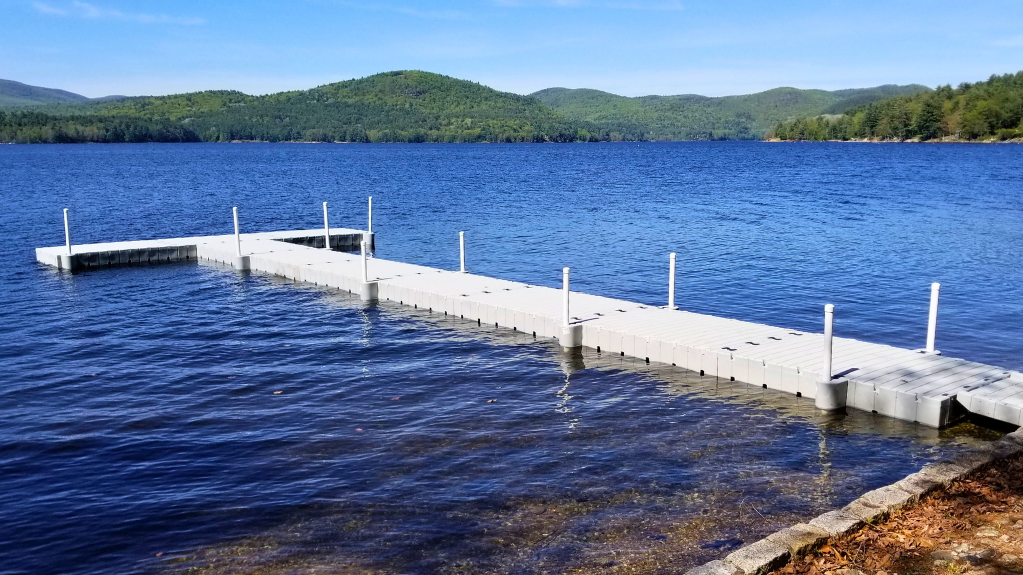Floating Docks: The Ideal Selection for Versatile Water Accessibility
Floating docks present an engaging solution for a variety of water access needs, offering convenience that transcends traditional mooring options. The modular nature of floating docks promotes customization, catering to particular needs.
Benefits of Floating Docks
Floating docks deal many advantages that enhance water accessibility for numerous applications. Their capacity to drop and increase with changing water levels makes them especially helpful in atmospheres with varying tides or seasonal variants. This adaptability makes sure that vessels can conveniently tie without problem for the water's deepness, offering a trusted platform for entertainment, commercial, and industrial usages.
Additionally, floating docks are often created from sturdy materials that withstand rust, making them appropriate for long-lasting usage in marine atmospheres. Their installment is typically much less invasive than traditional set docks, reducing the ecological influence and helping with quicker release (floating dock builder). This flexibility allows for less complicated moving or reconfiguration according to customer requirements or ecological adjustments
Safety and security is an additional key advantage; floating docks can provide stable gain access to for people getting off or boarding from watercrafts and reduce the risk of crashes connected with unpredictable surface areas. They can be created to fit a variety of devices, such as fenders and cleats, improving performance. Overall, floating docks represent a reliable solution for boosting water gain access to across diverse sectors while advertising security and environmental sustainability.

Kinds Of Floating Docks
Different sorts of floating docks accommodate various demands and atmospheres, each made with particular attributes to optimize performance. One of the most typical kinds consist of modular docks, which contain interlacing areas that enable very easy customization and expansion. These docks are ideal for entertainment use, as they can be tailored to fit numerous boat sizes and water conditions.
Another preferred option is the stationary floating dock, which continues to be anchored in position but floats with altering water degrees. floating dock services. This kind is particularly matched for locations with very little tidal variations, giving stable gain access to for fishing or swimming. Additionally, there are drive-on docks, which feature a sloped style that enables watercrafts to conveniently drive on and off, making them ideal for individual boat and smaller vessels
For business applications, sturdy floating docks are readily available, created from enhanced products to stand up to considerable loads and harsh marine environments. Lastly, green floating docks make use of lasting products and styles to lessen ecological effect, typically integrating functions like greenery to support local wild animals. Understanding the various sorts of floating docks makes sure that individuals can select one of the most ideal option for their details needs.
Setup Process Review
An effective installation of floating docks requires careful preparation and interest to information to make certain ideal performance and safety and security. The preliminary step involves analyzing the website conditions, consisting of water depth, present, and potential barriers. This evaluation educates the choice of the appropriate dock materials and design customized to the specific atmosphere.
Following, acquiring necessary licenses is crucial, as several jurisdictions have guidelines relating to building on water bodies. The installation can proceed when authorizations are secured. Begin by preparing the foundation, which might involve anchoring systems or pilings customized to the dock kind and neighborhood problems.
Adhering to the foundation configuration, assemble the dock sections according to maker specifications. Make certain that all components are safely attached and aligned to stand up to ecological tensions. Placement the dock in the designated area, guaranteeing it is degree and secure.

Maintenance Tips and Ideal Practices
After the installment procedure is total, continuous maintenance plays a vital role in ensuring the longevity and capability of floating docks. Regular examinations need to be carried out to determine any type of signs of damage, degeneration, or wear - floating dock services. Look for any loosened installations, splits, or separation in the dock areas, as these can jeopardize structural stability
Cleaning the dock is vital to get rid of debris, algae, and other accumulation that can affect its look and security. Make use of a gentle stress laundry Full Article regularly to maintain sanitation without triggering damage to the surface area. In addition, using a protective sealant every couple of years can aid boost durability and stand up to environmental wear.
Pay interest to the mooring lines and anchors, ensuring they are safe and cost-free from corrosion. Change any type of abject components immediately to avoid dangers. Seasonal modifications might additionally be necessary; throughout severe weather, reinforcing the dock or repositioning can protect against damages.
Applications for Floating Docks
Floating docks offer a multitude of applications, satisfying both commercial and leisure demands. In recreational settings, they supply seamless accessibility to rivers for tasks such as boating, angling, and swimming. Their adjustable nature permits installation in varying water levels, making sure secure and secure gain access to no matter of tidal variations.
Readily, floating docks are indispensable for marinas and waterfront services. They assist in the docking of vessels, allowing reliable filling and dumping of items. Their modular layout permits for very easy development or reconfiguration to fit changing business demands, making them perfect for watercraft services, tour operations, or angling charters.
Additionally, floating docks are used in ecological applications such as marine research and environment restoration. They can function as systems for clinical research studies, checking water top quality, or carrying out wildlife surveys without troubling delicate ecological communities.
In commercial contexts, floating docks are used in building tasks, giving accessibility to hard-to-reach areas for equipment and employees. Their adaptability, longevity, and marginal effect on the from this source setting make them an ideal option for a large range of applications, improving both functionality and access in different water-based environments.
Verdict
To conclude, floating docks represent an optimum option for diverse water gain access to needs, owing to their flexibility, resilience, and modular design. These frameworks help with secure mooring for different applications while minimizing environmental impact throughout installation. The lowered upkeep needs better improve their practicality. Therefore, floating docks work as a valuable asset for entertainment, industrial, and ecological projects, making certain reputable access to waterways and advertising lasting methods in marine environments.
Floating docks existing an engaging remedy for a selection of water navigate to these guys accessibility requires, offering flexibility that transcends conventional mooring choices.Floating docks offer numerous advantages that enhance water access for various applications. Overall, floating docks stand for a reliable remedy for boosting water accessibility throughout varied markets while advertising security and environmental sustainability.
Another popular option is the stationary floating dock, which continues to be secured in location but floats with transforming water degrees.In final thought, floating docks stand for an ideal service for diverse water access requires, owing to their versatility, longevity, and modular style.